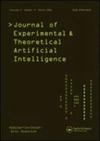人工智能在疫情后形势中的应用及对未来前景的借鉴
IF 1.7
4区 计算机科学
Q3 COMPUTER SCIENCE, ARTIFICIAL INTELLIGENCE
Journal of Experimental & Theoretical Artificial Intelligence
Pub Date : 2021-08-08
DOI:10.1080/0952813X.2021.1958063
引用次数: 0
摘要
冠状病毒病(COVID-19)大流行严重损害了人类的社会经济生活和世界各国的经济增长。人们在人工智能技术方面做出了许多努力,以便在早期发现冠状病毒,并采取必要的预防措施,阻止其传播或从感染中恢复。然而,形势和解决方案仍然具有挑战性。在本文中,我们提出了各种技术方面,使用监督/无监督方式的解决方案以及具有生理参数的连续健康监测。最后,利用语音信号验证了高斯混合模型-通用背景模型(GMM-UBM)技术检测COVID-19的性能。所开发的系统在受试者工作特征(ROC)曲线下面积60-67%范围内实现了COVID-19检测性能。此外,还介绍了从当前COVID-19危机中吸取的各种教训,以指导未来的方向。本文章由计算机程序翻译,如有差异,请以英文原文为准。
Application of Artificial Intelligence on Post Pandemic Situation and Lesson Learn for Future Prospects
ABSTRACT Coronavirus disease (COVID-19) pandemic has intensively damaged human socio-economic lives and the growth of countries around the world. Many efforts have been made in the direction of artificial intelligence (AI) techniques to detect the corona at an early stage and take necessary precautions to stop it from spreading or recovery from the infection. However, the situation and solutions are still challenging. In this paper, we proposed various technological aspects, solutions using a supervised/unsupervised manner and continuous health monitoring with physiological parameters. Finally, the performance of COVID-19 detection with Gaussian mixture model-universal background model (GMM-UBM) technique using the voice signal has been demonstrated. The developed system achieves the COVID-19 detection performance in terms of areas under receiver operating characteristic (ROC) curves in the range 60–67%. Moreover, the various lessons learned from the current COVID-19 crisis are presented for future directions.
求助全文
通过发布文献求助,成功后即可免费获取论文全文。
去求助
来源期刊
CiteScore
6.10
自引率
4.50%
发文量
89
审稿时长
>12 weeks
期刊介绍:
Journal of Experimental & Theoretical Artificial Intelligence (JETAI) is a world leading journal dedicated to publishing high quality, rigorously reviewed, original papers in artificial intelligence (AI) research.
The journal features work in all subfields of AI research and accepts both theoretical and applied research. Topics covered include, but are not limited to, the following:
• cognitive science
• games
• learning
• knowledge representation
• memory and neural system modelling
• perception
• problem-solving

 求助内容:
求助内容: 应助结果提醒方式:
应助结果提醒方式:


